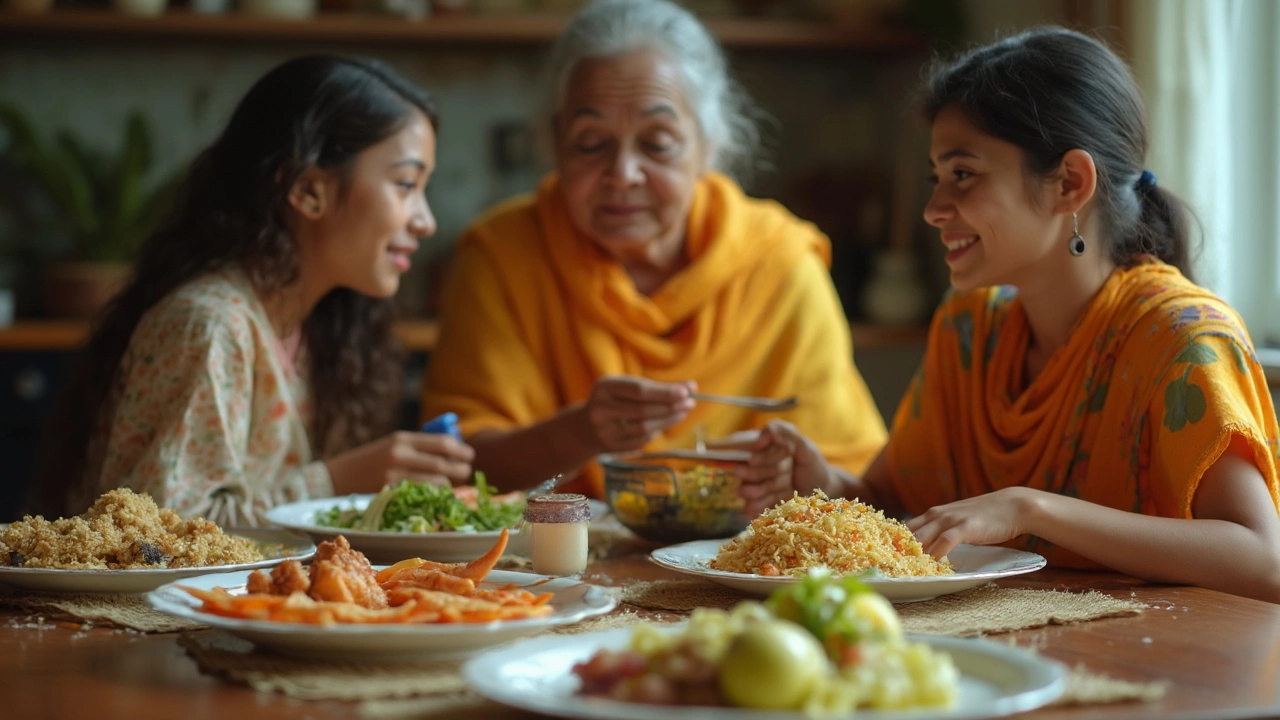Ever had a late-night burger and woke up feeling like a rock is sitting in your stomach? You’re not alone. Ayurveda, the ancient science of life, has plenty to say about this. In Ayurveda, nighttime is when your body is winding down and your digestion is not exactly firing on all cylinders. Munching the wrong stuff not only messes with your sleep, but can wreck your digestion, make you feel sluggish, and even hit your mood the next morning.
So what are these foods that make Ayurveda say, “Just don’t do it?” Is it just about greasy junk food or is there more to the story? Let’s clear up the confusion and keep it practical. Whether you follow Ayurveda to the letter or you just want to skip nighttime tummy troubles, knowing what to avoid can make a big difference. I’ll walk you through the exact foods that can ruin your night, what happens if you brush off these rules, and the easy swaps you can make for better snoozing and waking up fresh. Ready to find out what not to eat before bed? Stick around for real-life advice you can actually use.
- Why Ayurveda Cares About Nighttime Eating
- The Foods You Should Definitely Avoid
- What Happens When You Ignore These Rules
- Smart Swaps: Better Night Foods
- Ayurvedic Nighttime Eating Tips
Why Ayurveda Cares About Nighttime Eating
Ayurveda isn’t just another wellness trend—it’s a legit 5,000-year-old system that’s obsessed with how and when you eat. When the sun goes down, your body’s inner "digestive fire," called Agni, naturally cools off. According to Ayurveda, your gut is strongest during the day and weakest at night. So if you eat a heavy meal close to bedtime, your body can’t fully break it down, leading to that super uncomfortable feeling the next morning.
This is actually pretty logical: think about how you feel after a big dinner late at night versus something light. The science backs it up too: modern studies show that digestion slows down in the evening. When you don’t give digestion a break at night, it can mess with your sleep, immunity, and even how your skin looks. No one wants to wake up feeling drained or with a breakout because of a late-night dosa or cream-loaded dessert.
Ayurveda breaks it down more. There’s the famous biological clock called the "dosha clock." From 6 p.m. onwards, your body’s Kapha dosha takes over. Kapha is slow and heavy, so eating things that are also heavy just makes everything sluggish. That’s a one-way ticket to feeling foggy when you wake up, with leftover food still hanging around in your stomach.
The main thing? Ayurveda wants your dinner to be easy to digest, finished by sunset or at least a couple hours before you crash. That way, your digestive system gets time to rest, repair, and reset for the next day. So when people talk about eating small, light meals at night, it isn’t just random advice—it’s a core part of how Ayurveda views health and balance. Remember, when you hear the words Ayurveda and eating, think about timing just as much as what’s on your plate.
The Foods You Should Definitely Avoid
Ayurveda gets straight to the point about what not to touch at night, especially if you care about feeling good the next morning. The main idea? Stick to light, easy-to-digest stuff and skip anything that throws your system off balance. Here’s what makes the no-go list:
- Dairy Heavy Foods: Cheese, ice cream, and those thick milky desserts sound comfy but don’t fool yourself. According to Ayurveda, your digestion is weaker at night, and heavy dairy can cause mucus build-up, bloating, and restless sleep, especially if you already have a slow gut.
- Fried and Oily Snacks: Late-night samosas, fries, or pakoras? Skip them. They’re tough on digestion and can trigger heartburn, gas, or that heavy, groggy feeling in the morning. Your gut won’t thank you.
- Meats and Heavy Proteins: Red meat, chicken curry, or even fish are seen as “tamasik” (they slow things down, both in the body and mind) in Ayurvedic thinking. Your system needs more time to break them down, which often means trouble sleeping or weird dreams.
- Spicy Foods: Chili-heavy dishes, pickles, or hot curries not only keep you up but can also cause acid reflux. Ayurveda says spicy stuff increases Pitta (heat), which makes it even harder to wind down—think restless sleep or night sweats.
- Fermented Foods: Sourdough, dosa, cheese, and even some yogurts can upset your system. At night, the risk of extra gas, acidity, or disturbed sleep is higher.
- Raw Veggies and Salads: Surprised? Raw stuff takes work to digest, so that salad or crudité plate is better left for lunch.
- Sugary Treats: Cookies, chocolates, pastries—anything loaded with sugar can spike your blood sugar, mess with your sleep hormones, and leave you tired the next day.
To make it even clearer, here’s a quick breakdown of common foods and how they hit your system at night, according to both Ayurveda and what we know about digestion:
| Food Type | Why Ayurveda Avoids It at Night | How It Affects the Body |
|---|---|---|
| Dairy (heavy) | Makes digestion sluggish, increases mucus | Bloating, cough, sleep disruption |
| Fried/Oily Foods | Clogs digestive fire (Agni), creates toxins | Acidity, heaviness, poor sleep |
| Meat | Heavy, tamasik, requires strong digestion | Grogginess, disturbed dreams, indigestion |
| Spicy Dishes | Boosts internal heat (Pitta), disrupts calm | Reflux, sweating, broken sleep |
| Raw Veggies/Salads | Hard to break down, cold quality | Gas, bloating, uneasy stomach |
| Sugary Treats | Imbalances blood sugar, stimulates mind | Restlessness, hormonal disturbance |
If you find yourself craving these things, you’re not weird — it happens! But skipping them at night is one of the easiest ways to follow Ayurveda and wake up feeling light, clear-headed, and ready for the day. Remember, it’s not just about what you eat, but when you eat it too.

What Happens When You Ignore These Rules
If you wave off Ayurvedic advice and just eat whatever you crave at night, you sign yourself up for a bunch of annoying problems—sometimes right away, sometimes over the long haul. So what really goes down?
First, let’s get real about Ayurveda: It teaches that your digestive fire ("Agni") cools off at night. So if you pile on hard-to-digest foods, your system struggles. This means you may wake up groggy, heavy, or with a weird taste in your mouth. Late-night eating, especially of spicy, fried or heavy foods, can mess with your sleep, make you bloated, or give you heartburn.
“Your body is set up to rest and repair at night, not churn through a mountain of food. Eating late adds extra work for your gut and can disrupt your natural cycles.” — Dr. Vasant Lad, renowned Ayurvedic physician
Modern science backs this up, too. Studies have found that eating big meals or heavy stuff late can spike your blood sugar and insulin just when those should chill out for the night. If you’ve ever woken up feeling puffy or with stomach pain, your dinner plate is probably to blame.
- Acid reflux: Lying down after a late or greasy meal means stomach acid is more likely to splash up, giving you that burning chest feeling.
- Poor sleep: Spicy or high-fat foods can wake you up at night, or keep you from deep, restful sleep.
- Weight gain risk: Calories eaten at night don’t get burned off as easily, so it’s easier to pack on extra kilos.
- Sluggish mornings: If you eat late, your digestive system might still be digesting when it should be resetting. This means you can start your day feeling tired and irritable.
Check out some quick stats showing what can go wrong:
| Issue | Reported Increase With Late Eating |
|---|---|
| Acid Reflux | Up to 70% more likely |
| Poor Sleep Quality | 40% higher risk |
| Morning Fatigue | Nearly doubled |
| Weight Gain | 30% higher chance |
Here’s the bottom line: Ignoring the “don’t eat this at night” idea from Ayurveda isn’t just an ancient superstition. You’ll probably notice your body complaining—whether it’s through bad sleep, heartburn, or just dragging yourself out of bed. Swapping out those foods doesn’t take a huge effort, but it can seriously pay off with better health and happier mornings.
Smart Swaps: Better Night Foods
If you’re tired of waking up groggy or bloated, switching up your nighttime eats can help. Ayurveda recommends picking foods that are easy on the stomach and encourage deep, restful sleep. The trick is to eat light, warm, and well-cooked meals at night. Forget raw salads or greasy leftovers—those just make your digestive system work overtime when it should be chilling out.
So what are some real, practical choices? Let’s get into the details with a simple table. This gives you the best swaps for your evening routine, especially if you want to stick to Ayurveda advice without making life difficult:
| Swap This | For This | Why it Works |
|---|---|---|
| Pizza, Burgers, Heavy Meats | Rice with Moong Dal (yellow lentils) | Warm, light, easy to digest, and calming |
| Ice Cream, Cold Sweets | Warm milk with a pinch of nutmeg or turmeric | Supports sleep, soothes the gut |
| Raw Veggie Salads | Cooked veggies (like zucchini, carrots, or squash) | Less rough on digestion, less gas |
| Fried Snacks (chips, samosa) | Steamed or roasted sweet potato | Comforting, won’t cause heaviness |
| Sugary Desserts | Ripe banana or a few soaked almonds | Gently sweet and won’t spike blood sugar |
Another useful tip: keep your portions small and avoid eating less than two hours before sleep. If you’re starving late at night, go for a cup of warm ginger tea or a piece of fruit like papaya. These are easy on your tummy and won’t disturb your zzz’s.
- Warm over cold food: Your digestion likes warmth at night.
- Go for simple combos: Fewer ingredients mean fewer gut issues.
- Skip the spice overload: Too much chili or garlic will keep you up.
Ayurveda even suggests that what you eat can impact how you feel the next morning. A small study published in 2023 found that people who ate light, cooked meals at night had 30% fewer complaints of next-day bloating or sluggishness compared to those who ate heavy or spicy food. So, better sleep and a happier gut are just a few swaps away.

Ayurvedic Nighttime Eating Tips
Want to keep your sleep strong and your stomach happy? The old-school wisdom from Ayurveda has a surprisingly modern feel when it comes to eating at night — it’s all about keeping things light, simple, and at the right time. Here’s how to get it right, starting tonight.
- Eat Early: Ayurveda recommends having your last meal by 7 or 8 PM. Your digestion naturally slows down after sunset, so eating late puts extra pressure on your body.
- Keep It Light: Avoid heavy, oily, or fried foods for dinner. Go for warm, moist, and cooked foods instead. Stuff like a veggie khichdi or a simple dal soup works way better than pizza or a loaded sandwich.
- Watch the Dairy: Ayurveda says milk is okay at night — but keep it warm, spiced (like with cardamom or nutmeg), and without sugar. Avoid cheese and yogurt, though, since they can be tough to digest late in the day.
- Spice Wisely: Some spices like cumin, ginger, and black pepper support digestion at night, but go easy on chili or super spicy sauces, which can keep you tossing and turning.
- Skip Sweets and Ice-cold Drinks: Sugary treats can spike your energy right before bed, and cold drinks can mess with your digestive fire ("Agni"). Stick with room temperature or warm drinks.
If you want a quick cheat sheet, here’s a comparison of common night foods and their ayurvedic benefits or downfalls:
| Food | Ayurveda-Friendly? | Reason |
|---|---|---|
| Khichdi (light rice-lentil mix) | Yes | Easy to digest, calming |
| Salad (raw veggies) | No | Harder to digest at night |
| Warm milk (spiced) | Yes | Promotes sleep, soothes gut |
| Yogurt/Curd | No | Can cause mucus, tough to digest |
| Heavy fried food | No | Slows digestion, leads to heaviness |
| Steamed veggies | Yes | Light and warm, easy on stomach |
| Ice cream | No | Cold, sugary, blocks digestion |
One last thing: aim to eat in a calm setting, not while scrolling through your phone or binging TV. Ayurveda swears by mindful eating — and it actually helps prevent overeating and indigestion. Try these tweaks for a week and see how your sleep and belly behave. Even my dog Milo chills out better when I don’t eat junk late at night.
